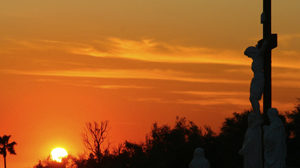Scripture:
2 Chronicles 36:14-16, 19-23
Ephesians 2:4-10
John 3:14-21
Reflection:
Arguably, one of the most recognizable verses in the New Testament is here before us:
“For God so loved the world, that he gave his only begotten son, that whoever believes in him should not perish, but have eternal life.” (Jn 3:16)
That passage, or its verse number, John 3:16, is emblazoned on T-shirts and sweatshirts. It is printed on coffee mugs, bookmarks, bumper stickers, even on the bottoms of In-‘N-Out milkshake containers. During football games and baseball games, someone, usually wearing a wild multi-colored wig, is waving a placard for all to see. And it reads: John 3:16.
But, despite all this biblical zeal, there lurks a problem. The passage has been axed from its contextual moorings. Consequently, its real meaning and impact have been lost, gone adrift in a sea of sentimentality.
The passage is indeed about God’s love for us, for the whole world. God loves us so much that he gave us his son. No argument there.
The issue lies with the word “gave.” It does not mean what we think it does; as in God “gave” us a gift. No.
In the Greek, the word “gave” is didomi. It means to surrender, to deliver up, to hand over, as in Jesus was handed over, surrendered to the Romans for crucifixion.
The passage, now stripped of popular piety, reveals its true meaning. It is now a sign of contradiction, the contradiction of the cross. For God so loved the world that he surrendered his son to the world, and even to humanity’s evil of crucifixion.
A sign of God’s love. A sign of the world’s violence. A sign of contradiction.
Nicodemus, under the cover of darkness, he was after all part of Jerusalem’s religious establishment, came to Jesus seeking to understand more about Jesus’ teaching.
Jesus taught him in these words:
“Just as Moses lifted up the serpent in the desert, so must the Son of Man be lifted up, so that everyone who believes in him may have eternal life.” (Jn 3:14-15)
Jesus was recalling the episode of Moses and the Israelites in the wilderness. Any Jew of the time would have caught the allusion immediately. Jesus was referring to the Book of Numbers, chapter 21. The Israelites were complaining that they didn’t have food and would starve in the wilderness. So, God gave them manna. Then they grumbled that they didn’t have enough water to keep from dying of thirst. So, God gave them all the water they needed. Apparently, not good enough for the demanding Israelites. They now whined that they were pretty sick of that stuff called manna, “this wretched food,” as they described it. And for good measure, they moaned in self-pity that they would have been better off as slaves in Egypt. At least there, they would have had shelter, food and water, without having to wander in the wilderness.
Finally, God said enough is enough. He punished the ungrateful Israelites by sending hundreds of poisonous, fiery snakes among them. Many of the people died painful deaths from the serpents’ venomous bite, or was it perhaps from the venom of their own rejection of God.
They rushed to Moses saying “we have sinned by speaking against the LORD and against you. Intercede with the LORD so that he will take the snakes away from us!” (Nm 21:7).
God relented. He told Moses to make a bronze serpent, mount it on a pole, then lift the serpent high so that all who gaze in faith on the bronze serpent would be healed of their poisonous and deadly wound.
The serpent, the instrument of death, now became for the Israelites a symbol of life.
A sign of contradiction.
To Nicodemus, who must have been scratching his head, wondering “what does all this mean?” Jesus brought it home for him. Just like that bronze serpent, so too must the Son of Man be lifted up, so that all who gaze up at him in faith, believing in him “will have eternal life” (Jn 3:15).
Right about now, we may be like Nicodemus, scratching our heads, too. What exactly does Jesus mean by being “lifted up”? Those words “lifted up” is the Greek word hypsothenai. It has a two-fold meaning. It can mean lifted up in the literal sense, as in Jesus being lifted up on the cross, his crucifixion.
Hypsothenai also has another meaning. It can mean to exalt. Those words, “lifted up,” now have depth. They mean both. They mean Jesus being lifted up in the ignominy and violence of the cross. But the cross also means the moment of Jesus’ exaltation, when he most profoundly reveals God’s love to the world tormented by hatred and violence. For Nicodemus – and for us — Jesus unfolds the mystery of the healing cross by placing it against the silhouette of the healing bronze serpent raised up in the wilderness.
A sign of contradiction. This happens even today.
At Mass, when the priest lifts high and exalts the Body of Christ, it will look to all the world like just an ordinary wafer of bread. But to those of us who, with eyes of faith, can gaze on this manna from heaven, this bread of life, it is the real presence, body, blood, soul and divinity of Christ.
It is a sign of contradiction. And it is best understood with the words:
“For God so loved the world that he surrendered his only son for us.”
Deacon Manuel Valencia is on the staff at Mater Dolorosa Passionist Retreat Center, Sierra Madre, California.

Deacon Valencia, I was greatly moved by your Reflection of today’s Gospel. It has given me a great deal of inner thought and reflection of my own as I have meditated upon your words. Truly the Holy Spirit’s providence surly must have inspired this most excellent Reflection!
Thank You Deacon and May God Bless!